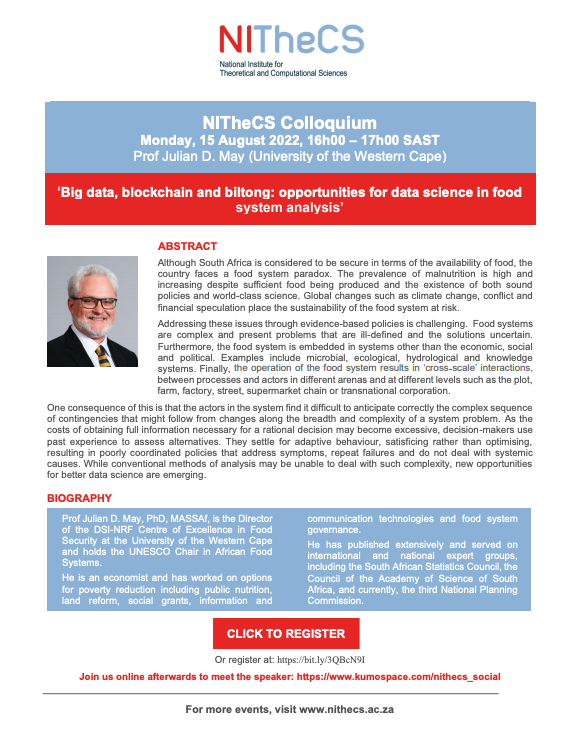Time: 16:00 - 17:00
Venue: Zoom
National Institute for Theoretical and Computational Sciences (NITheCS) colloquium: ‘Big data, blockchain and biltong: opportunities for data science in food system analysis’
Date: Monday, 15 August 2022
Time: 16:00 – 17:00 SAST
Speaker: Professor Julian D. May (University of the Western Cape)

‘Big data, blockchain and biltong: opportunities for data science in food system analysis’
ABSTRACT
Although South Africa is considered to be secure in terms of the availability of food, the country faces a food system paradox. The prevalence of malnutrition is high and increasing despite sufficient food being produced and the existence of both sound policies and world-class science. Global changes such as climate change, conflict and financial speculation place the sustainability of the food system at risk.
Addressing these issues through evidence-based policies is challenging. Food systems are complex and present problems that are ill-defined and the solutions uncertain. Furthermore, the food system is embedded in systems other than the economic, social and political. Examples include microbial, ecological, hydrological and knowledge systems. Finally, the operation of the food system results in ‘cross-scale’ interactions, between processes and actors in different arenas and at different levels such as the plot, farm, factory, street, supermarket chain or transnational corporation.
One consequence of this is that the actors in the system find it difficult to anticipate correctly the complex sequence of contingencies that might follow from changes along the breadth and complexity of a system problem. As the costs of obtaining full information necessary for a rational decision may become excessive, decision-makers use past experience to assess alternatives. They settle for adaptive behaviour, satisficing rather than optimising, resulting in poorly coordinated policies that address symptoms, repeat failures and do not deal with systemic causes. While conventional methods of analysis may be unable to deal with such complexity, new opportunities for better data science are emerging.
BIOGRAPHY
Professor Julian D. May, PhD, MASSAf, is the director of the DSI-NRF Centre of Excellence in Food Security (CoE-FS) at the University of the Western Cape and holds the UNESCO Chair in African Food Systems. He is an economist and has worked on options for poverty reduction including public nutrition, land reform, social grants, information and communication technologies and food system governance. He has published extensively and served on international and national expert groups, including the South African Statistics Council, the Council of the Academy of Science of South Africa, and currently, the third National Planning Commission.
- Click here to register.
- Join us online afterwards to meet the speaker: https://www.kumospace.com/nithecs_social.
Upcoming Events
Our GOALS
We recognise that producers, processors, distributors and consumers are incorporated into the food system under varying terms and returns. We also recognise the economic, social, human and environmental health impacts associated with food security. Therefore our goal is to conduct research, build capacity and disseminate findings that will promote a sustainable food system in South Africa.
Our MISSION
Our research is concerned with the scale, nature, causes and consequences of food insecurity in South Africa and elsewhere on the African continent. Thus our mission is to investigate products, technologies, processes and policies that can reduce food insecurity and mitigate its negative outcomes. We seek to make a difference to food security by linking innovative science with critical enquiry.



